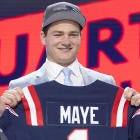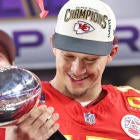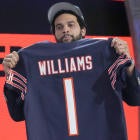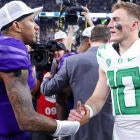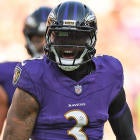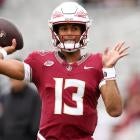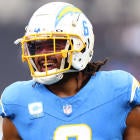
In late June, Hernandez, a former Pro Bowl tight end with the Patriots, was charged with first-degree murder in the shooting death of Odin Lloyd. He's currently in jail awaiting trial.
During a roundtable discussion with ESPN co-workers Cris Carter, Keyshawn Johnson and Tom Jackson, Lewis said that the Patriots should have had an idea that Hernandez's off-field baggage might catch up to him.
"I want to make sure we clear something up because we have to do this for our brand of the National Football League: Our numbers are very small when it comes to the pain and the crime that happens in everyday America, the numbers of athletes that get in trouble," Lewis said in response to Carter's claim that Hernandez's case could harm the NFL's image (via the Baltimore Sun). "New England had to know something, just like 31 other teams had to know something about Aaron Hernandez's background, and that's your red flag. Now, it's up to you to say, 'You know what, I'm still going to try that.'"
Lewis isn't wrong. The Patriots -- along with 31 other teams -- were well aware of Hernandez's troubles at Florida, and it's why the tight end fell to the fourth round.
And when coach Bill Belichick addressed the media prior to training camp, he conceded that the team's draft process is more art than science and there's always room for improvement. "I think we'll continue to look at ourselves in the mirror and see where we can do a better job," he said, "maybe where we can improve."
Lewis, meanwhile, said that the Ravens had nothing to worry about when he left the University of Miami in 1996.
"They didn't have to do a background check on me coming out of college," he said. "I was clean off the field."
But Lewis added that once he got in trouble following the 2000 season, getting a call from then-Ravens owner Art Modell made all the difference.
"I think the biggest phone call I received after my mom's phone call when I went through that was Art Modell," Lewis said. "He's dead and resting in peace now. That shows you the connection I had with my organization is they knew who I was as a man. They had been with me for five years at that point in my career. The thing that we should clear up and we're athletes.
"Before we're athletes, we're human beings," he continued. "The bottom line is we will find a way as human beings to make a mistake somewhere down the road. The biggest thing I had to change, and Keyshawn, you and me just spoke about this, was I had to change the people I was around because the people I was around wasn't thinking the way I was thinking, they weren't training the way I was training, they wasn't doing the things that would take me to where I needed to go. They were actually making me regress and make me go backwards."
Lewis' decision to disassociate with those people offered him nothing but trouble came after talking with former teammate Shannon Sharpe.
"You know what, my change only came when I found myself in that situation," Lewis said. "What happens with people like us is your heart steps in the way most of the time. You always want to help where you came from, but you can't help. Shannon Sharpe, the No. 1 thing is he said, 'Now, you have a different opportunity to start over. The only way to start over is to change the people you're around.' That right there, changed my whole perspective."
For Hernandez, that advice might be too late.













